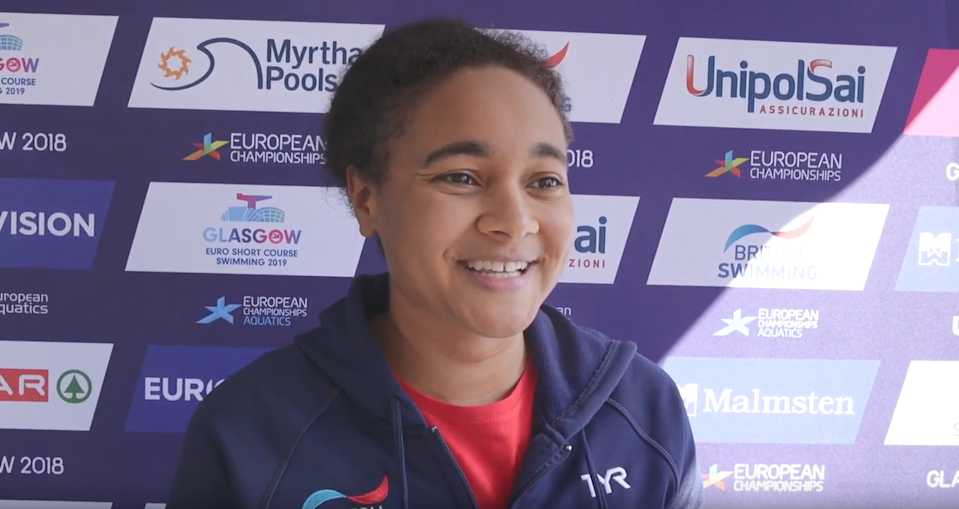GB swimmer Alice Dearing on her mission to stamp out racism in sport

Becoming the poster girl for race equality in sport is the last thing Alice Dearing wants, but at present the young swimmer can see no other way around the issue, writes Alice-Reeves Turner.
She may only be 22, but Dearing, the only black swimmer in the Team GB swimming squad, has long been on a mission to dispel myths that have long existed in her sport: the main one being that black people, can’t, or shouldn’t, swim.
She has directly experienced issues of racism in sport. At the age of 17, a rival swimmer’s coach indirectly referred to Dearing as a “skinny n****r”.
And that incident was certainly not the first time an athlete has been faced with racism in their career, and it is definitely a long way off being the last, the England men’s national team being the latest to deal with racist abuse from fans during their recent fixture against Bulgaria in Sofia.
After UEFA announced yesterday that Bulgaria would only pay a minimal fine of £64,641 for their fans’ racist abuse, plenty were quick to call for tougher sanctions, including Liverpool youngster Rhian Brewster and former Manchester City midfielder Yaya Touré.
But for athletes like Brewster, Touré and Dearing, speaking up rarely feels like a victory. In fact, Dearing questions why they should have to be the ones speaking up at all.
“I honestly don’t think it will ever stop. The way it is in football, it’s bad. It's not just one voice, it’s thousands,” she said.
“The moment you get one person saying it more will say it. Whether or not those people believe what they are saying or not the fact it’s being said is just bad enough.
“I struggle to see how something like that will be stamped out. I’m idealistic but then also realistic about it, it’s such a big thing that needs to change and I don’t think anybody knows where to start, let alone players or athletes ourselves.
“We shouldn’t have to deal with this, we shouldn’t have to be the ones saying, ‘Wait racism is wrong.’ There should be people in the likes of FIFA that should be stopping this, but something is going wrong somewhere, and people are being allowed to get away with saying such things."
The comment she received will always serve as a reminder for Dearing of the racism which occurs in all walks of life, but the swimmer does not want to be seen as a victim.
Instead, she wants to use her individuality to raise awareness into the issue.
Dearing is doing as much as she can to fight the battle for better representation in her sport at all levels, at the same time as completing a Master’s degree at Loughborough University and working towards qualifying for the 2020 Olympic Games in Tokyo.
She said: “It can obviously be seen as a controversial issue, especially amongst swimmers. I know from my own experiences that people don’t really like to talk about this, I don’t even really like talking about it because as the minority, it can often get taken as me whining or looking to get attention.
“But I feel I’ve got to the age now where I’m mature enough to know that there's consequences from talking about this. People might not like what I say, but I’m willing to face those consequences because this is something bigger than myself and I want to help it as much as I can. I need to use my voice.
“I really don’t want to make myself a victim in any way. I don’t want people to pity me for being the only black person on the team. That’s not what I’m looking for. Instead I want to raise awareness that there is a lower amount of black swimmers in general and try and change that if I can.”
The Loughborough student hopes to help overcome this cultural issue by supporting Ed Accura’s campaign ‘Blacks can Swim’, which aims to remove the myth of black people being unable to swim and encourage more to get involved in the sport.
But while she wants to play a leading role at accelerating the slow uptake of black swimmers in Great Britain, Dearing knows the battle is not one that can be fought from the bottom up.
She added: “Obviously there's loads of problems with swimming at the bottom level as not enough black kids are getting into swimming, and then obviously if they're not even learning to swim, how are they going to become Olympic champions?
“It’s really hard because you can’t be what you can’t see, so you really need some people at the top to be a voice for it in a way and that’s what I’m trying to do.
“It sounds quite arrogant and I don’t want to herald myself as the face of it but if one person can help inspire another person a chain reaction can happen.
“That’s what I’m looking for. I really do think you need representation at the top for change to happen as it will hopefully filter down.”

